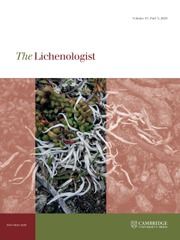Crossref Citations
This article has been cited by the following publications. This list is generated based on data provided by
Crossref.
Dettki, Holger
and
Esseen, Per‐Anders
1998.
Epiphytic macrolichens in managed and natural forest landscapes: a comparison at two spatial scales.
Ecography,
Vol. 21,
Issue. 6,
p.
613.
Kuusinen, M.
and
Siitonen, J.
1998.
Epiphytic lichen diversity in old‐growth and managedPicea abiesstands in southern Finland.
Journal of Vegetation Science,
Vol. 9,
Issue. 2,
p.
283.
Gauslaa, Y.
Ohlson, M.
and
Rolstad, J.
1998.
Fine‐scale distribution of the epiphytic lichenUsnea longissimaon two even‐aged neighbouringPicea abiestrees.
Journal of Vegetation Science,
Vol. 9,
Issue. 1,
p.
95.
Sipman, Harrie J. M.
1999.
Progress in Botany.
Vol. 60,
Issue. ,
p.
438.
LOPPI, S
BONINI, I
and
DEDOMINICIS, V
1999.
Epiphytic lichens and bryophytes of forest ecosystems in Tuscany (Central Italy).
Cryptogamie Mycologie,
Vol. 20,
Issue. 2,
p.
127.
Uliczka, Helen
and
Angelstam, Per
1999.
Occurrence of epiphytic macrolichens in relation to tree species and age in managed boreal forest.
Ecography,
Vol. 22,
Issue. 4,
p.
396.
Bunnell, F L
Kremsater, L L
and
Wind, E
1999.
Managing to sustain vertebrate richness in forests of the Pacific Northwest: relationships within stands.
Environmental Reviews,
Vol. 7,
Issue. 3,
p.
97.
Poikolainen, Jarmo
Kuusinen, Mikko
and
Mikkola, Kari
2000.
Forest Condition in a Changing Environment.
Vol. 65,
Issue. ,
p.
162.
Ojala, E
Mönkkönen, M
and
Inkeröinen., J
2000.
Epiphytic bryophytes on European aspenPopulus tremulain old-growth forests in northeastern Finland and in adjacent sites in Russia.
Canadian Journal of Botany,
Vol. 78,
Issue. 4,
p.
529.
Moe, Bjørn
and
Botnen, Astri
2000.
Epiphytic vegetation on pollarded trunks of Fraxinus excelsior in four different habitats at Grinde, Leikanger, western Norway.
Plant Ecology,
Vol. 151,
Issue. 2,
p.
143.
Thomas, Sean C
Liguori, Denise A
and
Halpern, Charles B
2001.
Corticolous bryophytes in managed Douglas-fir forests: habitat differentiation and responses to thinning and fertilization.
Canadian Journal of Botany,
Vol. 79,
Issue. 8,
p.
886.
Rouvinen, Seppo
and
Kouki, Jari
2002.
Spatiotemporal Availability of Dead Wood in Protected Old-growth Forests: A Case Study from Boreal Forests in Eastern Finland.
Scandinavian Journal of Forest Research,
Vol. 17,
Issue. 4,
p.
317.
Hunter, Malcolm L.
and
Webb, Sara L.
2002.
Enlisting Taxonomists to Survey Poorly Known Taxa for Biodiversity Conservation: a Lichen Case Study.
Conservation Biology,
Vol. 16,
Issue. 3,
p.
660.
Will-Wolf, S.
Esseen, P.-A.
and
Neitlich, P.
2002.
Monitoring with Lichens — Monitoring Lichens.
p.
203.
Hedenås, Henrik
and
Ericson, Lars
2003.
RESPONSE OF EPIPHYTIC LICHENS ON POPULUS TREMULA IN A SELECTIVE CUTTING EXPERIMENT.
Ecological Applications,
Vol. 13,
Issue. 4,
p.
1124.
Pinho, P.
Augusto, S.
Branquinho, C.
Bio, A.
Pereira, M. J.
Soares, A.
and
Catarino, F.
2004.
Mapping Lichen Diversity as a First Step for Air Quality Assessment.
Journal of Atmospheric Chemistry,
Vol. 49,
Issue. 1-3,
p.
377.
Snäll, Tord
Hagström, Anna
Rudolphi, Jörgen
and
Rydin, Håkan
2004.
Distribution pattern of the epiphyteNeckera pennataon three spatial scales – importance of past landscape structure, connectivity and local conditions.
Ecography,
Vol. 27,
Issue. 6,
p.
757.
SNÄLL, T.
FOGELQVIST, J.
RIBEIRO, P. J.
and
LASCOUX, M.
2004.
Spatial genetic structure in two congeneric epiphytes with different dispersal strategies analysed by three different methods.
Molecular Ecology,
Vol. 13,
Issue. 8,
p.
2109.
Loppi, Stefano
and
Frati, Luisa
2004.
Influence of Tree Substrate on the Diversity of Epiphytic Lichens: Comparison Between Tilia platyphyllos and Quercus ilex (Central Italy).
The Bryologist,
Vol. 107,
Issue. 3,
p.
340.
Hedenås, Henrik
and
Ericson, Lars
2004.
Aspen lichens in agricultural and forest landscapes: the importance of habitat quality.
Ecography,
Vol. 27,
Issue. 4,
p.
521.


